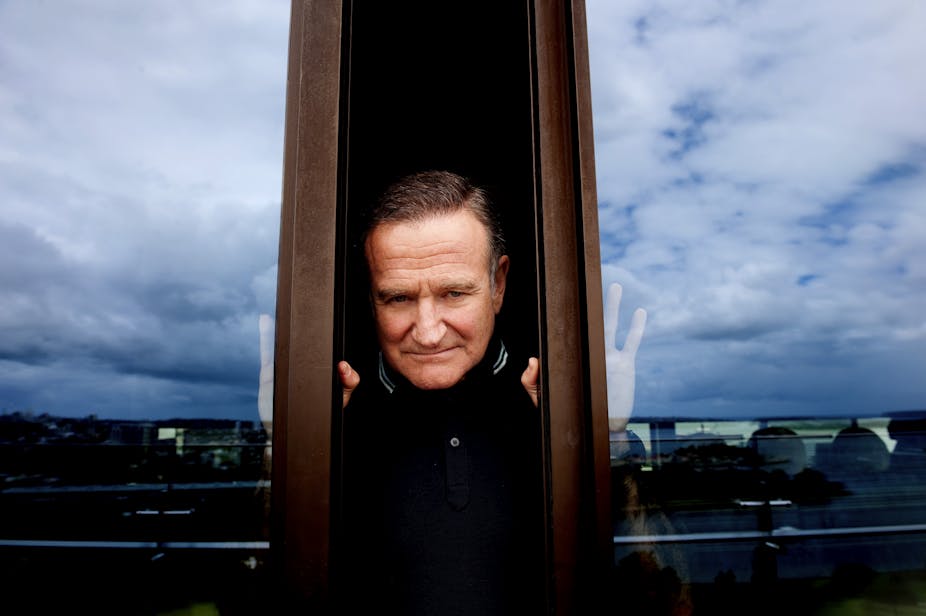American actor and stand-up comedian Robin Williams has died today, aged 63. Barack Obama posted a statement about his death and noted, in a rather odd turn of phrase, that “he arrived in our lives as an alien”. Williams’ break-out role was as the alien Mork who arrived on earth to observe human behaviour.
Though his long and successful career comprised sold-out tours and feature film leads, including Oscar nominated and winning turns in dramatic roles, I am still not surprised that it is Mork-from-Ork related tributes crowding my Facebook and Twitter feeds today, posted by my shocked and saddened Gen-X peers. I have now lost count of those making some reverse variation on “Mork calling Orson”.
These could be misconstrued as flippant responses to the tragic and untimely end of a complex and creative life. But for many of us, Robin William’s performance in the spin-off Mork and Mindy (1978-82) was our first exposure to this free form style of improvised physical and verbal comedy.
Fonzie’s water ski jump in the fifth season of Happy Days (1974-84) was famously deemed so ludicrous that the term “jump the shark” became television parlance. Specifically, shorthand for those moments when TV shows pushed the content past what their once loyal viewers considered believable.
Undeterred, Happy Days ran for another seven years and, in episode 22 of that same apparently questionable season, introduced an extra-terrestrial craft piloted by a character named Mork. That legend has a shark, not an alien from Ork, derailing the credibility of this popular 70s sit-com is a testament to the performance of then relatively unknown stand-up comedian Robin Williams.
Mork’s attempt to free an egg in the pilot episode (above) might just have been the funniest thing this 9-year-old had ever watched on the small screen.
As with all good fish-out-of-water stories, through Mork’s eyes we were encouraged to develop our own curiosity around human behaviour; which recalls a much earlier carnivalesque tradition whereby, as comedy scholar Frank Krutnik has observed:
the comedian figure’s alienation from or resistance to everyday social codes […] also displays the comedian’s creative dexterity as a performer.
If one function of comedy is to question the status quo, then watching Mork drink through his finger or sit upside down on a chair was an early masterclass in what was possible.
Williams of course went on to carry comedy feature films, many of which we might call “comedian comedies” – what film academic Geoff King defines as those films where:
The name of the comic performer, and the promise of the routine, is usually the main box office draw.
In other words, as engaged as we might be by Adrian Cronauer (Good Morning Vietnam, 1987) or Mrs. Doubtfire (1993), we remain aware we are watching the comic skills and techniques of Williams whom, fittingly in the case of these two examples and others, is often playing a character who is required to “perform” himself.

English comedian David Walliams notes in his 2012 memoir Camp David that:
no one wants to be laughed at, and certainly not the comedian. He or she creates comedy to control the laughter at them, and turns it into being laughed with.
As a Mork and Mindy-watching, laugh-seeking child, I recall the same discomfort with unsolicited laughter, and was not comforted by (probably insincere) assurances that adults were laughing with me, not at me. Thus John Keating’s quip (Dead Poets Society, 1989) “we’re not laughing at you, we’re laughing near you” some ten years later was both funny and validating.
Whether it came from the pen of screenwriter Tom Schulman or not, it felt to me like Robin Williams telling the truth.
I can only speculate as to what level of responsibility must be felt when the promise of one’s routine is, as aforementioned, “the main box office draw”. But though Mork’s “constant displays of humour [were] not welcome here on Ork” (according to Orson in the pilot episode), those of Williams were most welcome here on Earth.
And will be missed.
If you have depression or feel very low, please seek support immediately. For support in a crisis, contact Lifeline on 13 11 14. For information about depression and suicide prevention, visit beyondblue, Sane or The Samaritans.

